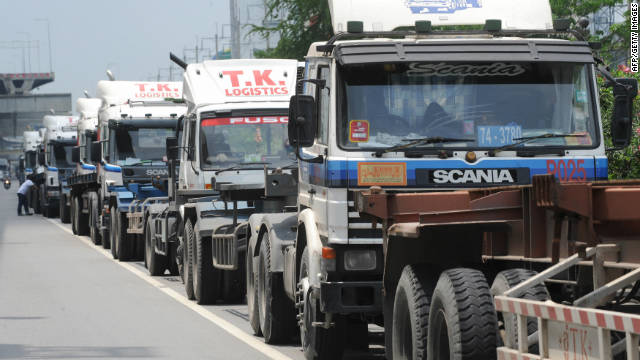
(CNN) -- They may no longer ride on horseback with long black capes and a pistol in their belts, but highway robbers are far from a thing of thing of the past.
Cargo crime -- where consumer goods are stolen in transit -- has risen dramatically over the last decade, according to logistics security specialists Freightwatch International. It says the number of known cases worldwide has increased by an average of 10-15% year on year.
Dan Burges, senior director of intelligence at Freightwatch, which is one of the few firms to compile global data on the subject, says that cargo theft accounts for $30-50 billion of company losses worldwide every year.
"But this is likely a very conservative estimate -- many thefts go unreported and there is no central gathering of data," he says.
The most recent Freightwatch figures indicate that South Africa, Mexico and Brazil are among the nations with the highest levels of cargo theft.
Trucks are by far the most popular target. Burgess says that in the U.S. last year, the average market value of a lorry-load of stolen pharmaceuticals -- the most valuable cargo by weight -- was over $3.5 million.
Watch video: Sniffing out contraband luggage
And yet prosecution rates remain low. A 2008 report from the International Road Transport Union says that only 2% of all reported freight crime in Europe led to convictions. This compares to 60% of reported cases of retail theft, according to figures cited in the same study.
The discrepancy is in large part down to perceptions of cargo theft as a "victimless crime" -- or, at least, a victim that no one particularly cares about, says Burges.
"The public don't think about logistics and supply chains or the financial well-being of large electronics companies," he says. "But when it comes to someone stealing from the local shop, or robbing an old person on the street, these are much more emotive crimes."
Paul Linders -- head of operations at the Transport Asset Protection Association -- says that the apparent impunity with which cargo thieves have been operating can no longer be sustained.
"With the increasing production of small, high-value consumer goods like smart phones and expensive branded pharmaceuticals, the value of individual hauls is going up," he says. "And now with more people using the internet for purchases, it's become much easier to find buyers."
They like technology because it's predictable...what they fear are humans and dogs
Dr Daniel Ekwall, logistics expert
Dr Daniel Ekwall, logistics expert
So, what is the industry doing to tackle the problem? Linders says that improved security technology certainly has a role to play.
"From installing GPS tracking systems in the cargo itself, rather than just on the lorries; devising a network of dedicated driver routes, improving door-locking and alarm systems, to simply securing tank fuel tanks ... it's amazing how many thefts are caused by gangs filling up the tank with sawdust, then just following the lorry for 20 minutes until it breaks down at the side of the road," he says.
In recent years, tracking systems have been developed that can remotely disable a truck once it's been stolen, while geographical "geo-fences" can be created to notify the dispatcher when a truck moves beyond a defined boundary.
One commercially available product even allows trucks and containers to be remotely locked and unlocked using a smart phone.
However, there's only so much technology can do. Burges says what really matters is the conduct of the drivers themselves. "After all, he or she is effectively the only security guard in a traveling warehouse ... they need to have better training and stricter codes of practice when it comes to things like leaving the lorry unattended."
Daniel Ekwall, senior lecturer of logistics at the University of Boras, in Sweden, agrees. He says that unlike retail theft -- where improved surveillance and detection technology has helped significantly reduce losses over the years -- cargo theft requires a much more human response.
"Retail thieves are opportunistic and generally not very intelligent -- and they fear technology because they don't understand it," he says. "On the other hand, cargo thieves are much more premeditated in their actions. They like technology because it's predictable ... what they fear are humans and dogs."
Linders thinks he has a solution that marries both technology and best practice.
"At the moment drivers are required by law to have an eight-hour break for sleep. Most of the time they just stop at the side of the road -- and overwhelmingly this is the point at which the majority of cargo thefts happen," he explains.
"Our vision is to introduce a network of highly secure parking stations in every country. Some have already been built, but until there's enough to make it convenient for drivers, the problem will persist."
No comments:
Post a Comment